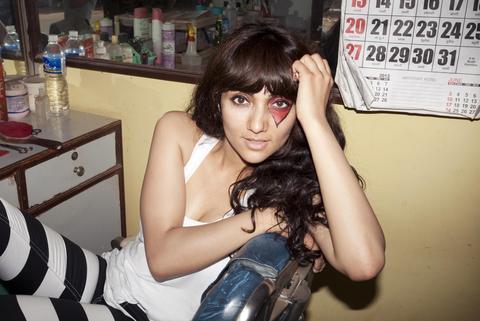Samsaya
Listen to Stereotype
Why do you listen to music?
Entertainment? Distraction? Escapism?
All fair reasons. Certain albums, though, add another, deeper layer: the ability to travel both across continents and through time with a simple click of a Play button.
Bombay Calling, the sophomore album from Norwegian singer Samsaya, isn't just a genre-busting set of songs drawing from pop, dance, hip hop, funk, soul and Bollywood. It's a long-distance call to the singer's heritage, one that augments modern pop with traditional Indian sounds that'll still fill any club in Miami or Los Angeles, but won't sound like the same clichéd Top 40 songs you've heard for years.
On Bombay, one hears the uptempo funk of "Stereotype" and bubbly synths of "Superhero" clash against the grinding, industrial pop of "Good With the Bad" and R&B synths-meets-Indian percussion of the title track. Produced by multi-platinum-selling Roc Nation producer Fred Ball, the album fits alongside your favorite Rihanna, M.I.A. and Amy Winehouse records, with a twist.
"I like to make music that comes from an emotional place, and sometimes, that may not sound pretty, and I don't think it necessarily should," says Samsaya from her home in Norway. "It's okay for it to sound a little ugly. The music is about pureness."
This extends to Bombay Calling's lyrics, which draw on the singer's experiences "growing up feeling Norwegian but not looking stereotypically Norwegian." "A lot of people are run by fear and I try to infuse so much love that you don't have to fearm" the singer says. "Music is an architect with the power to build bridges. It meets you at the dance floor but it still makes you think and connects your heart."
Influenced by everyone from Mary J. Blige and TLC to OutKast and famed Indian singer Asha Bhosle, Samsaya, whose name means "doubt" in Hindi, has "always questioned everything," writing reactionary, iconoclastic lyrics as a child. "At 12, I heard Dinah Washington's 'I'm Mad About the Boy' and hearing that trumpet-type voice, something happened to me," recalls the singer. "Religious lyrics and traditional music didn't have soul. This moved me." Eschewing her parents' pleas to play classical Indian music in favor of more beat-driven tracks, Samsaya released Shedding Skin, her debut album, in 2004, and has released a steady stream of singles since.
While her parents have accepted her career choice ("Two years ago, they'd hand me employment forms for various jobs"), Samsaya's rebellious streak remains. When major labels asked the singer to fix a three-millimeter gap between her two front teeth, she refused and named her own record label 3MM Records. "I thought my teeth were the prettiest, coolest thing about me," the singer says. "It later became a big symbol to me of self-perception and not compromising."
This extends to Samsaya's live performance, which always features a heart painted over the singer's left eye. "It's a reminder that everything I meet and see, I will look upon with my heart and see it with an open mind," says the singer. "The first thing people see is the face and I was always hoping people would see beyond that. I started wearing what was inside of me on the outside."
"Heart" and "soul." Two words oft overused but on Bombay Calling, wholly appropriate. On "Breaking Bad," a song that could easily fit in any Top 40 radio station, generic pop tropes are replaced with the singer's upending of traditional gender and ethnic roles. It's heady stuff for pop music, but not unusual for Samsaya's strong beliefs. Catchy pop music and smart lyricism don't have to be mutually exclusive. Bombay Calling is living proof.
















